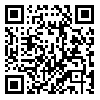Volume 14, Issue 3 (Summer 2025)
aumj 2025, 14(3): 291-300 |
Back to browse issues page
Download citation:
BibTeX | RIS | EndNote | Medlars | ProCite | Reference Manager | RefWorks
Send citation to:



BibTeX | RIS | EndNote | Medlars | ProCite | Reference Manager | RefWorks
Send citation to:
Allah Moradian M J, MirKhalili S A A. Criticism of William Glaser's view on parents' controlling behaviors on children and the impact of these behaviors on mental health from the perspective of Islam. aumj 2025; 14 (3) :291-300
URL: http://aums.abzums.ac.ir/article-1-1774-en.html
URL: http://aums.abzums.ac.ir/article-1-1774-en.html
1- Islamic Azad University, Karaj branch, Karaj, Iran
2- Alborz University of Medical Sciences, Karaj, Iran ,s.mirkhalili@abzums.ac.ir
2- Alborz University of Medical Sciences, Karaj, Iran ,
Abstract: (661 Views)
Introduction: This research investigates the quality of control, particularly parental control, and its impact on family mental health. It seeks to address questions regarding the main root of mental disorders in Glasser’s view, the quality and extent of control behaviors, and criticisms of Glasser’s perspective from an Islamic approach.
Method: The study employs a narrative review method, analyzing Glasser’s concepts of internal and external control and examining Quranic and narrative concepts in this context.
Findings: Glasser advocates for eliminating controlling behaviors such as criticism, complaining, blaming, nagging, threatening, punishing, and blackmailing, and instead promoting negotiation, listening, friendship, respect, and intimacy for better relationships. However, Islamic teachings do not consider these alternative behaviors sufficient and allow for the use of some controlling behaviors in a specific and minimal manner.
Conclusion: Glasser’s analysis and explanation of mental health and satisfaction resulting from healthy interpersonal relationships without controlling behaviors contrast with Islamic teachings, which suggest that control behaviors can sometimes be necessary to maintain a relationship.
Method: The study employs a narrative review method, analyzing Glasser’s concepts of internal and external control and examining Quranic and narrative concepts in this context.
Findings: Glasser advocates for eliminating controlling behaviors such as criticism, complaining, blaming, nagging, threatening, punishing, and blackmailing, and instead promoting negotiation, listening, friendship, respect, and intimacy for better relationships. However, Islamic teachings do not consider these alternative behaviors sufficient and allow for the use of some controlling behaviors in a specific and minimal manner.
Conclusion: Glasser’s analysis and explanation of mental health and satisfaction resulting from healthy interpersonal relationships without controlling behaviors contrast with Islamic teachings, which suggest that control behaviors can sometimes be necessary to maintain a relationship.
Keywords: Parental control, Family mental health, Glasser’s view on mental disorders, Control behaviors, Islamic perspective on control behaviors
Type of Study: Original |
Subject:
General
Received: 2024/01/30 | Accepted: 2025/03/13 | Published: 2025/05/26
Received: 2024/01/30 | Accepted: 2025/03/13 | Published: 2025/05/26
References
1. Akbari M, Arianpour H, Rezapour Mirsaleh Y. The effectiveness of group reality therapy based on choice theory on responsibility, locus of control, and reduction of agonist medication dosage in substance-dependent individuals under maintenance treatment. Addiction Research (E'tiyad-Pazhouhi, 2022 (In Persion) [DOI:10.52547/etiadpajohi.16.65.227]
2. Glasser W. Choice Theory in the Counseling Room. Sahebi A, Soltani Far A, translators. Tehran: Saye Sokhan Publication; 2021. (In persion(
3. Ibn Abi al-Hadid. Sharh Nahj al-Balagha. Vol. 7. 1st ed. Qom: Ayatollah Mar'ashi Najafi Library; 1958. (In Persion)
4. Glasser W. Choice Theory in the Counseling Room. Sahebi A, Soltani Far A, translators. Tehran: Saye Sokhan Publication; 2021. (In persion)
5. Holy Quran, 2000. (In Arabic)
6. Glasser W. Every Student Can Succeed. Sahebi A, translator. Tehran: Saye Sokhan Publication; 2017. (In Persion)
7. Glasser W. for Parents and Teenagers: dissolving the barrier between you and your teen. Sahebi A, translator. Tehran: Saye Sokhan Publications; 2015. (In Persion)
8. Glasser W. Control Theory: A New Explanation of How We Control Our Lives, Melikian A, Ahmadi SA, translators. Tehran: Rah-e Kamal Publication.2008 (In Persion)
9. Choice theory approach in the story of "The Lion and the Beasts" from the first book of Masnavi-ye Ma'navi. Didactic Literature Review. 2023;(57)15
10. Movahedi Rad M, Ebrahimi MS, Sahebi A. The effect of choice theory training on basic needs satisfaction and aggression level in high school girls. Royesh-e-Ravanshenasi (Rooyesh-e-Ravanshenasi Journal (RRJ)) 2021;10(9
11. Montaseraldooleh N, Sadeghi Nejad S, Ghorbanpour Ahmad Sargourabi F, Faraji Z. The effectiveness of choice theory training on aggression in mothers of students. Advances in Psychology, Educational Sciences and Education. 2023;6(58)
12. Mohammadi S. The effect of reality therapy on students' discipline with emphasis on the quality world. In: Proceedings of the National Conference on Research in Management and Humanities in Iran; 2024
13. Tarkamani Barandoozi V. Investigating the Basic Needs in Vis's Personality Using William Glasser's Choice Theory. Journal of Literary Studies and Research. 2021; (2)12
14. Nuri al-Tabarsi MH. Mustadrak al-Wasail wa Mustanbat al-Masail. Qom: Institute of Ahl al-Bayt (a.s.), Ihya' al-Turath; 1990. (In persion)
15. Saduq. Man La Yahduruhu al-Faqih. Vol. 3. Qom: Society of Seminary Teachers Publications; 1992. (In Persion)
16. Muttaqi, Alaa al-Din ibn Hissam al-Din Hindi. Al-Mirshid ila Kanz al-Amal fi Sunan al-Aqwal wa al-Ahal. Beirut: Al-Risala Institute. 1989. (In Persion)
17. Tamimi Amadi, Abdul Wahid bin Muhammad. Gharar al-Hikam wa Durar al-Kalim, translated by Mustafa Derayati. Mashhad: Zarih Aftab publication. 2002. (In Persion)
18. Tabatabai, Mohammad Hossein. Sunan al-Nabi. Tehran: Islamieh Publication. 1996. (In Persion)
19. Majlisi MB. Bihar al-Anwar. Vol. 72. Beirut: Dar al-Ihya' al-Turath al-Arabi,1982 (In Persion)
20. Mohammadi Far M, Ghaeri Zadeh T, Fathi Azar S. The effectiveness of spiritual care and choice theory on academic vitality and flourishing of students. Journal of New Psychological Research. 2024; (73) 19
21. Qorbanpour Lafmejani H, Qorbanpour Lafmejani A. Critique of the anthropological view of Glasser's reality therapy theory based on Imam Ali's anthropological perspective in Nahj al-Balagha. Seraj Monir. 2021;(42)12
Send email to the article author
| Rights and permissions | |
 |
This work is licensed under a Creative Commons Attribution-NonCommercial 4.0 International License. |







